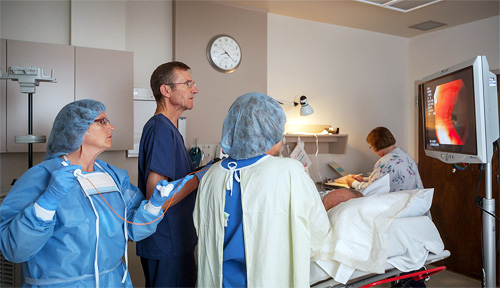Gerald Luckey, M.D., starts each day before dawn and works past dusk. He is a primary care doctor in David City, Neb., on the frontline of U.S. health care.
The shortage of these physicians — including family medicine doctors, internists, pediatricians and gynecologists — is expected to reach nearly 45,000 by 2020, according to the Association of American Medical Colleges.
New medical school graduates are often lured into specialty practice by the promise of higher pay and shorter hours. Primary care doctors, though, say the opportunity to treat a variety of conditions and become part of a community is worth the trade-off.
Following Dr. Luckey, 67, through what he calls a typical day makes it clear what’s essential in primary care: broad and deep medical knowledge … and a good pair of tennis shoes.
6:19 a.m.: Dr. Luckey picks weeds in front of his two-story house — stethoscope in hand. Earlier, over a slice of toast and coffee, he dialed into the Healthland Network with his iPad to check the vital signs of hospitalized patients. “It helps me get a head start to
the day.”
6:29 a.m.: Dr. Luckey hops on his bike for a quick ride to work.
6:36 a.m.: A mile and a half later, he arrives at the Butler County Health Care Center, where he has served the people of rural Nebraska for more than three decades. Inside, Dr. Luckey trades his loafers for tennis shoes, his slacks for scrubs and his tie for a white coat.
6:53 a.m.: In the procedure room, the docket lists two colonoscopies and an upper GI endoscopy. The 1973 alum uses a video-game like controller to view the woman’s intestines; he notes diverticulums in the colon — a weakness in the muscle wall. “She just needs to eat more old-fashioned oatmeal.”
In a town of fewer than 3,000 people, it’s not surprising that Dr. Luckey’s next patient taught his nurse’s teenage son to drive a stick shift and pulled her car out of a ditch last winter. That patient is John Dehner, and it’s his 81st birthday.
8:16 a.m.: The AM radio plays softly as Dr. Luckey performs an upper GI endoscopy on Dehner. A dose of “bubble buster” to clear away saliva reveals an abnormal, corkscrew-like swallow. With the help of his team, he nips a piece of esophagus to test for possible Barrett’s esophagus. They’ll know the results tomorrow. In the waiting room,
he tells Dehner’s wife of 50-plus years that everything went well. “Now, let’s get John some birthday cake.”
10:27 a.m.: Procedures completed, clinic begins. Dr. Luckey’s first is a two-for-one — Albin and Gladys Shultz. He doesn’t mind. “You get more accurate information.”
Hanging on the wall is a plaque shaped like the State of Nebraska: “2003 Nebraska Family Physician of the Year.” Dr. Luckey also received the 2012 J.G. Elliott Award from
UNMC for being an “outstanding physician, leader, educator and innovator in rural medicine practice.”
Unlike many office-based family physicians, Dr. Luckey and his students do hospital rounds, perform surgeries every Wednesday, dabble in obstetrics and gynecology and rotate on-call duties in the emergency room every fifth day. On his “day off” he rounds at the nursing home.
12:02 p.m.: Dr. Luckey helps himself to oven-fried chicken and cranberry salad as he joins a confidential credentialing meeting.
12:46 p.m.: Dr. Luckey sips a Diet Mountain Dew outside the clinic exam rooms then walks by the mailroom, past his overflowing inbox. He’s part of a physician’s group whose members exchange charts for review. He’s also affiliated with several physicians hoping to set up a rural Accountable Care Organization or Health Care Co-op. He spends weekend nights on these projects.
The appointments continue well into the afternoon. Problems with knees, hips and blood pressure. Bed sores. Dry mouth. Dry skin. Diabetes. (No more “Mexi-fried nachos” for that guy). Back pain. Chest pain. Plain old pain.
One woman brings in all 10 of her prescription bottles. This is why Dr. Luckey favors the medical home concept, where one physician coordinates all the care. The idea is to keep patient costs down by serving as a one-stop shop. “If we send people away (for their health care), that’s bad for the local economy,” he said. “We want to keep them home. Patients appreciate having their health care delivered in their hometown.”
4:07 p.m.: A patient with a marginally low thyroid level is feeling “pepless.” Dr. Luckey also checks her feet for psoriasis, places her shoes back on and tells her he always wanted to be a shoe salesman.
For the clinic staff, 5 o’clock signals quitting time. Dr. Luckey still has hours of work ahead — check on three patients admitted to the hospital, write a dozen or so prescriptions and finish documentation on today’s patient visits.
About 8 p.m., he heads home for dinner with his wife, but he’s back at the clinic by 9:30
to sign off on more than 35 messages.
11:45 p.m.: He’s home for the night. In less than 7 hours, he’ll pedal back to the clinic to do it all over again.
“It occurs to me that this schedule is not what many people desire,” he said. “It just happens to be what I enjoy.”
